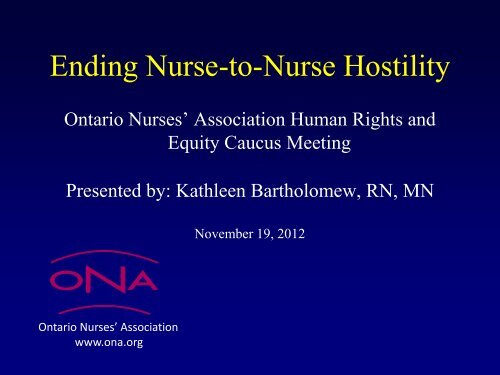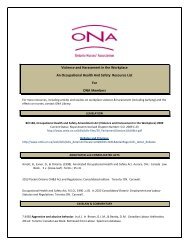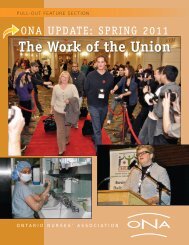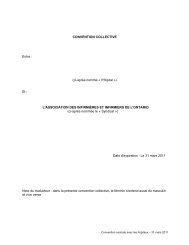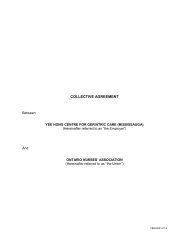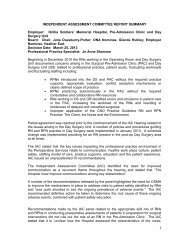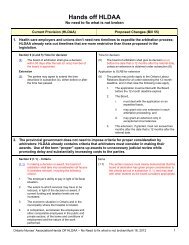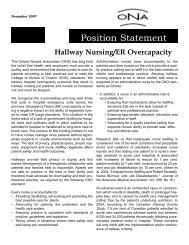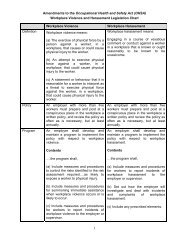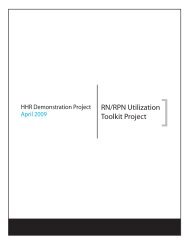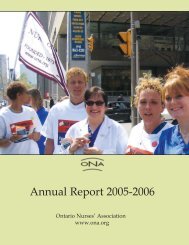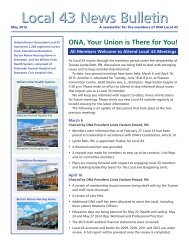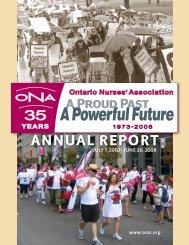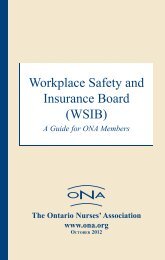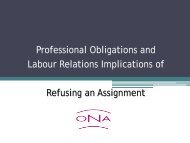Kathleen Bartholomew presentation - Ontario Nurses' Association
Kathleen Bartholomew presentation - Ontario Nurses' Association
Kathleen Bartholomew presentation - Ontario Nurses' Association
Create successful ePaper yourself
Turn your PDF publications into a flip-book with our unique Google optimized e-Paper software.
Ending Nurse-to-Nurse Hostility<br />
<strong>Ontario</strong> Nurses’ <strong>Association</strong> Human Rights and<br />
Equity Caucus Meeting<br />
Presented by: <strong>Kathleen</strong> <strong>Bartholomew</strong>, RN, MN<br />
November 19, 2012<br />
<strong>Ontario</strong> Nurses’ <strong>Association</strong><br />
www.ona.org
Healing RN-RN Hostility<br />
Tell Me Your Story…<br />
<strong>Kathleen</strong> <strong>Bartholomew</strong>, RN, MN<br />
kathleenbart@msn.com<br />
Seattle, Washington
“Alas, culture is not what we say,<br />
what we think, what we mean, or<br />
even what we intend;<br />
it's what we do.”<br />
Jon Burroughs, MD
Horizontal Hostility<br />
A consistent (hidden) pattern of behavior<br />
designed to control, diminish,<br />
or devalue another peer (or group)<br />
that creates a risk to health<br />
and/or safety<br />
(Quine 1999, Farrell 2005)
Shares 3 elements common to racial and<br />
sexual harassments laws:<br />
1. Defined in terms of effect on recipient<br />
2. Must be a negative effect on victim<br />
3. The bullying behavior must be consistent<br />
(Quine, 1999)
Overt:<br />
name-calling, sarcasm, bickering, faultfinding,<br />
back-stabbing, criticism,<br />
intimidation, gossip, shouting, blaming, putdowns,<br />
raising eyebrows, etc.<br />
Covert:<br />
unfair assignments, eye-rolling, ignoring,<br />
making faces (behind someone’s back),<br />
refusal to help, sighing, whining, sarcasm,<br />
refusal to work with someone, sabotage,<br />
isolation, exclusion, fabrication, etc.
Most Frequent Forms<br />
• Nonverbal innuendo (raised eyebrow, faces)<br />
• Verbal affront (covert or snide remarks)<br />
• Undermining activities (being unavailable)<br />
• Withholding information (practice or patient<br />
• Sabotage (deliberately setting up a negative<br />
situation)<br />
J. Advanced Nursing ‘97
WA State ER Nurses<br />
• Withholding information 45%<br />
• Ordered to do work below competence 40%<br />
• Opinions and views ignored 33%<br />
• Pressure not to claim something 28%<br />
• Key areas of responsibility removed 27%<br />
• Being ignored or excluded 25%<br />
JONA Vol. 39 No 2
Aftermath…<br />
• “Nearly everyone got even”<br />
• Intentionally lower productivity<br />
• Cut back hours<br />
• Give minimal effort<br />
• Left the job – months afterward<br />
• Lost respect for boss<br />
(The Cost of Bad Behavior)
Why do nurses minimize HH?<br />
• Doesn’t match virtue image<br />
• They also do it<br />
• Too close – focus is on workload<br />
• Don’t know how to confront behavior<br />
• Low confidence/self-esteem<br />
• “Herd Mentality” – they expect hostility<br />
Farrell, 2000
International Prevalence<br />
44% reported “bullying”<br />
Bullied staff had lower job satisfaction<br />
higher stress, depression, & anxiety<br />
and higher intent to leave<br />
33% were intending to leave because of<br />
verbal abuse
United States<br />
Empirical studies<br />
1. 82% witnessed in last yr.<br />
2. 77% saw negative RN-RN behaviors<br />
2. 28% in survey of US occupations (16)<br />
2. 31% Mass. Study (15)<br />
3. 27.3% bullied in last 6 mo. (17)<br />
4. 46% reported serious LV behaviors (2)<br />
- Verbal abuse from physicians 90-97% (9)
“Of all types of<br />
aggression<br />
nurses experience,<br />
peer to peer<br />
hostility is<br />
the most harmful.”<br />
Farrell, 1999
Individual Impact<br />
- Psychological, physical, emotional, social<br />
- Direct relationship btw conflict and burnout<br />
- Decreased job satisfaction and morale<br />
- Increased intent to leave
“All too often we leave the workplace<br />
bone tired and soul weary, trying to<br />
shake off the sticky residue of moral<br />
distress, that awful realization that we<br />
could not give patients the care they<br />
deserved.”<br />
Thomas (2004)
Human Adaptability<br />
Changes that are small and<br />
incremental are not noticed
Theoretical Framework<br />
Oppression Theory<br />
Major characteristics of oppressed<br />
behavior stem from the ability of dominant<br />
groups to identify the “right” norms and<br />
values and from their power to enforce<br />
them.
OBJECTIVE<br />
CURE<br />
SCIENCE<br />
LEFT BRAIN<br />
SUBJECTIVE<br />
CARE<br />
ART<br />
RIGHT BRAIN
When what you do is disconnected from<br />
what you value,<br />
You begin to feel anger, fear,<br />
helplessness and a lack of energy<br />
(Quine 1996)
Whose doing the bullying?<br />
• 50% identified managers/directors<br />
• 25% identified charge nurses<br />
• 29 % physicians<br />
• 38% coworkers<br />
JONA Vol. 39(2)
Life Classic Photographs by J. Loengard
Life Classic Photographs by J. Loengard
“What will we do with all this spare time?
Emotions running strong…<br />
Because nurses<br />
- do emotional work<br />
- do not have an outlet for frustration<br />
- do not have an opportunity to<br />
process (reflection)<br />
- are wounded by horizontal hostility<br />
- lack a support system/solidarity<br />
- have adapted to an increased pace<br />
of work and workload
Intrinsic Factors<br />
• Emotional State – anger, burnout<br />
• Personality Style – Type “A”<br />
• Intergenerational conflict<br />
• Inadequate conflict management skills<br />
• Intermittent reinforcement is strongest<br />
• Beliefs and expectations
Extrinsic Factors<br />
• Violent workplace<br />
• Poor nurse-physician relationships<br />
• Task and time imperatives<br />
• Changing role/responsibilities of managers<br />
• Demands for efficiency/productivity<br />
• Culture – history of no feedback
Impact on Profession of Nursing<br />
- Recruitment/ Retention in a shortage<br />
- Lack of staff due to increased sick days<br />
related to stress and burnout<br />
- Creates a toxic work environment<br />
- Failure of nursing to achieve solidarity<br />
- Patient safety: can’t think clearly when<br />
upset
“What we need is what the<br />
ancient Israelites called hochma<br />
…the capacity to see, to feel and<br />
then to act as if the future<br />
depended on you.<br />
Believe me, it does.”<br />
Bill Moyer
Response: Strategies and Tools<br />
1. Decrease negativity, gossip and a culture of blame<br />
by maintaining a zero tolerance for any communication<br />
that is unhealthy<br />
2. Increase a climate of safety and healthy<br />
communication by role modeling and utilizing<br />
opportunities to teach interpersonal and confrontation<br />
skills.
www.silencekills.com<br />
• 84% of MD’s have seen coworkers taking<br />
shortcuts that could be dangerous to patients<br />
• 88% of MD’s say they work with people<br />
who show poor clinical judgment<br />
• Fewer than 10% of MD’s, RN’s and clinical<br />
staff directly confront their colleagues about<br />
concerns
www.silencekills.com<br />
• 78% said it was difficult if impossible to<br />
confront a person or group directly (keeping<br />
silent) if they exhibited incompetent care<br />
• “Self Silencing” (Jack 1991)<br />
• “Value relationship so much that they will<br />
sacrifice interpersonal confrontation and<br />
assertiveness to keep the peace”
“ If you want to create<br />
an alternative future,<br />
you have to change<br />
the way people speak<br />
and listen to each other”<br />
Peter Block
JCAHO Statistics*<br />
*http://www.jcaho.org/accredited+organizations.htm
“Our lives begin to end<br />
the day we become silent about<br />
things that matter”<br />
M. L. King
Why don’t you speak your truth?<br />
• Fear of retaliation<br />
• Fear of hurting the relationship/feelings<br />
• Fear of gossip, scapegoating,<br />
• No time<br />
• Why bother? Nothing will change<br />
• Fear of being isolated from the group<br />
(<strong>Bartholomew</strong>, 09)
The<br />
Grey<br />
Zone
“When someone dumps their toxic<br />
feelings on us…they activate in us<br />
circuitry for those very same<br />
distressing emotions.<br />
Their act has powerful neurological<br />
consequences: emotions are<br />
contagious.”<br />
Daniel Goleman
What do you say after you hear that<br />
someone has been backstabbing you?
SIP Communication Model<br />
Situation - Describe the situation in<br />
specific, observable, behavioural terms<br />
Impact - Share the impact the behaviour had<br />
on the organization, on the team, or on you<br />
Pull - piece - See it through their eyes
S<br />
"When you delivered the work to me two<br />
days late...“<br />
I<br />
"I ended up scrambling and was unable<br />
to meet the patient need“<br />
P<br />
"Can you tell me what was going on for<br />
you?
You are late for report and as you<br />
open the door you hear,<br />
“I hate to follow <strong>Kathleen</strong> - she’s<br />
always dumping on the next shift.
S – When I walked into the report room, I<br />
heard….<br />
I - I was upset, because I was unaware that<br />
anyone in the next shift thought I was<br />
leaving things…<br />
P - Can you tell me what it’s been like for<br />
you to follow me, and specifically what<br />
you’ve found?...
How do I approach an experienced nurse<br />
when she makes it obvious in many ways<br />
that she has no time patience or empathy<br />
for my concerns?
S I recognize you have a heavy workload. This<br />
morning when I walked into your office you seemed<br />
bothered by my questions and I felt in the way.<br />
I The impact on me was that I felt ignored and<br />
unimportant - like you wished I wasn't there. The<br />
impact on the patient was that I wasn’t comfortable<br />
enough to find the answers I was looking for.<br />
P I want to learn and be the best nurse I can be.<br />
Can you help me understand what was going on for<br />
you? Is there another way I could have approached<br />
you to get information?
• Ask for what you need<br />
• It isn’t a request,<br />
if you expect a ‘yes’
To thrive horizontal hostility needs:<br />
secrecy<br />
shame<br />
silent witness
Sample Questionnaire<br />
I am respected by my peers 1 2 3 4 5<br />
I feel supported by my peers 1 2 3 4 5<br />
I can safely express my opinions 1 2 3 4 5<br />
I feel a strong sense of belonging 1 2 3 4 5<br />
What I like the most about my team is_____________<br />
What I need more from this team is ______________
Ask For Feedback<br />
• What do you like that I do<br />
well?<br />
• What would you like to see<br />
more of?
Nurturing Our Young<br />
“ The profession of nursing has an<br />
obligation to reduce lateral violence...<br />
Griffin 2004
New Grads<br />
• 60% of newly registered nurses leave<br />
their first position within 6 mo. because<br />
of some form of lateral violence Griffin<br />
• Almost half of new grads experienced<br />
humiliation and rudeness; and distress<br />
McKenna
Professional Behaviors<br />
• Accept one’s fair share of the workload<br />
• Keep confidences<br />
• Work cooperatively, despite feelings of dislike<br />
• Always look co-workers in the eye<br />
• Don’t engage in conversation about a coworker<br />
• Stand up for an “absent member” in conversations<br />
• Don’t criticize publicly<br />
• Don’t be overly inquisitive about each other’s lives<br />
• Do repay debts, favors, and compliments
to<br />
Responding<br />
to<br />
Horizontal Hostility<br />
Non-verbal inuendos (raising eyebrows or making<br />
faces)<br />
“I see from your facial expression that there may<br />
be something you wanted to say to me. It’s ok to speak<br />
to me directly”
Link safety and the relationship…<br />
• 67% saw link between disruptive behavior<br />
and medical mistakes<br />
• 18% knew of a mistake that occurred<br />
because of an obnoxious doctor<br />
(Rosenstein)<br />
• 40% withheld medication concerns;<br />
As a result, 7% contributed to med error<br />
(Safe Medication Practices)
Action Plan for New Nurses<br />
1. Teach cognitive rehearsal skills in nursing school<br />
2. Student nurse feedback to preceptor<br />
3. Utilize a coaching model for education<br />
4. Share a meal 1:1 in the first 2 weeks<br />
5. Affirm individual contributions<br />
6. Make the time for reflective practice<br />
7. Adopt a mentorship program<br />
8. Decrease precepting nurse’s workload<br />
9. Share a story from your first week
RN Action Plan<br />
1. Be aware of the signs and symptoms of HH<br />
2. Understand the many forces nurses affecting<br />
nurses today<br />
3. Speak your truth – hold crucial conversations<br />
4. Adopt a zero tolerance unit philosophy<br />
5. Take care of yourself
Revolutionary New Nurse Beliefs<br />
• A good nurse takes care of herself<br />
• A good nurse needs the help and support of<br />
her peers<br />
• A good nurse seizes the details of a mistake<br />
and shares them to improve practice<br />
• A good nurse speaks her truth at all times<br />
• A good nurse nurtures and feeds new nurses<br />
• A good nurse demonstrates professionalism
6. Evaluate your belief system<br />
7. Take the time to reflect on your practice<br />
8. Education<br />
- Assertiveness training<br />
- Confrontation skills – DESC model<br />
- Juice “Pull Conversation” skills<br />
- Non-violent communication<br />
8. Compliment each other – often!<br />
9. Provide opportunities for socialization<br />
10. Never be a “silent witness”<br />
11. Ask for feedback – peer review
AJN Faces of Caring
AJN Faces of Caring
Thank you!<br />
• <strong>Kathleen</strong> <strong>Bartholomew</strong><br />
• kathleenbart@msn.com<br />
• 206-356-2599<br />
• www.kathleenbartholomew.com


